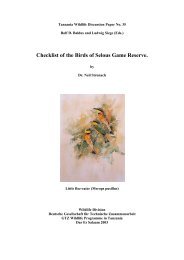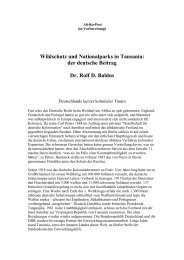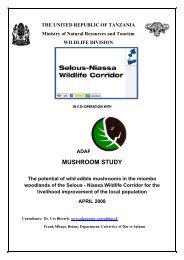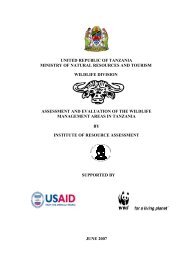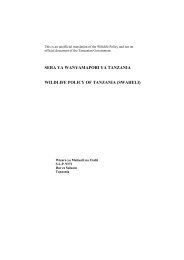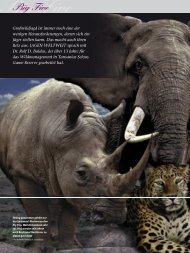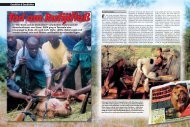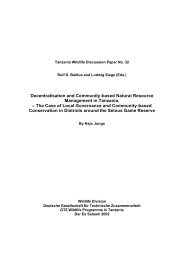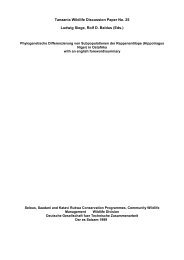What Do You Know About Conservation Hunting?Conservation hunting is a form of regulated hunting contributing to conservation of local <strong>wildlife</strong>populations and providing social and economic benefits to involved local <strong>com</strong>munities.The Conservation Hunting (CH) website aims to provide information on current research and discussionregarding the concepts, background, scope and out<strong>com</strong>e of CH, particularly in the Canadian North, but alsoelsewhere. Input and <strong>com</strong>ments from all Conservation Hunting stakeholders, including researchers in variousdisciplines, <strong>wildlife</strong> managers, co-managers, policy advisers, hunters, outfitters, and conservationists isinvited.About Conservation Hunting:The term 'conservation hunting' is now applied to sport or recreational hunting when those hunts result indefinite conservation and social benefits. Conservation hunting (CH) is considered a form of regulatedhunting that provides diverse conservation benefits to both local <strong>wildlife</strong> populations and to rural<strong>com</strong>munities. Conservation Hunting is appropriately applied to all animals subjected to hunting for recreation,management, food and other culturally-significant purposes. A number of international environmentalconventions and organizations recognize that the regulated sustainable use of <strong>wildlife</strong> provides economicincentives that contribute to biodiversity conservation and cultural sustainability.Wildlife-derived economic incentives and the resulting economic diversification may serve to protect<strong>wildlife</strong> habitat and cultural practices from the damaging impacts of alternative land use practices, especiallyat a time when such activities may place an additional burden on human and biological <strong>com</strong>munities subjectto climatic and other environmental stressors. Conservation hunting given its socio-economic and culturalcontributions to local <strong>com</strong>munities has the potential to contribute to human adaptation in the changing world.Key Components of conservation-hunting programs and their relationship to <strong>wildlife</strong> populations,ecosystems and people (Abstract) by W.A. Wall and B.J. KernohanThere has been growing recognition from the international conservation <strong>com</strong>munity that conservationhuntingprograms can provide the basis for successful sustainable use conservation. These programs, basedin an ecosystem context, can be of considerable support for <strong>com</strong>munity-based <strong>wildlife</strong> managementprograms. A conservation-hunting program is one that contributes to the short and long-term viability of thespecies populations within an ecosystem context by generating incentives, management regime, and/orsources of funds for purposes of conservation. However, there is a general lack of understanding of thenecessary <strong>com</strong>ponents for these programs and how interactions of these <strong>com</strong>ponents provide for success orimpediments to conservation. Components of conservation-hunting programs include: a transparent legalbasis within the range state including linkage with international regulatory bodies such as CITES; anadequate biological management system based in adaptive management; an adequate economic basewhich links incentives for local conservation to a local or international market through good businesspractices; and an appropriate local cultural context.Conservation-hunting programs worldwide have reached varying levels of success. Since differentgovernments, cultures, ecosystems and species populations respond differently, it is critical to fit the programto the local and regional circumstances.This paper presents a framework for organizing and describing key <strong>com</strong>ponents of conservation-huntingprograms and discusses their relationship to <strong>wildlife</strong> populations, ecosystems and people. Presented areaxioms of biodiversity conservation and conservation-hunting programs to establish <strong>com</strong>mon ground fromwhich a series of principles and criteria are derived. This lead paper establishes the underlying context forexploring each of the case studies presented in the papers of the symposium.For more details view the Conservation Hunting website http://www.ualberta.ca/~ccinst/CH/index.htmContact: Dr. Kashif M Sheikh, Program Manager Conservation Hunting, Canadian Circumpolar Institute,University of Alberta Suite 308, Campus Tower 8625-112 St., Edmonton T6G 0H1, Alberta Canada, Tel: 780-492-0108 kashif.sheikh@ualberta.ca68
From the Editor’s Desk (Extracts)In this issue of <strong>African</strong> <strong>Indaba</strong> we continue the discussion about hunting inside protected areas with anarticle by Cleve Cheney, a former Kruger Park Ranger, and the statement of the Game Rangers’ Associationof Africa. With the contributions in earlier issues we are moving towards a broad-based dialogue.There are questions regarding what to do with proliferating game populations on finite land and my articleon the last page, “Development of Game Prices in South Africa”, highlights some concerns. There is also theburning issue of funding <strong>African</strong> protected areas in view of other important national issues like poverty reliefand empowerment of disadvantaged <strong>African</strong>s who live next to protected areas. Most importantly, we have torecognize that government funds are scarce and much more needed for instance for pressing health issueslike the HIV pandemic.I have made already some proposals in “Hunting in South Africa: Facts, Risks, Opportunities”especially with regards to broad based black economic empowerment and how incentive-driven-conservationcan assist including the majority of South <strong>African</strong>s into the future of biodiversity conservation.A number of voices from the hunting <strong>com</strong>munity will certainly claim that hunting within protected areas andselling live game originating from there constitutes unfair <strong>com</strong>petition for the private game and huntingindustries. There will also be outcries from many quarters claiming the “sacrosanct” status our protectedareas. Many ecotourism stakeholders will protest, citing their perception of a range of global repercussions.But the problems cannot be wished away – we do not live in a utopian paradise where the lion sleeps next tothe lamb.We need to be pragmatic and veer from single-minded or single-species preservationist objectives towardsa <strong>com</strong>prehensive triple-bottom-line conservation approach tackling the <strong>com</strong>plicated array of social, economicand ecological issues. Look at Namibia’s northeastern Caprivi Region and the protected areas of Bwabwata,Mudumu and Mamili. Trophy hunting has played an important in<strong>com</strong>e-generating role there, but during thepast two years the program has been put on ice unnecessarily. However, according to reports received onlydays ago, hunting is to resume in August. There are other examples from Europe – for instance Germany,France, Spain and Switzerland were conservation hunting plays its role inside protected areas.The International Council for Game and Wildlife Conservation (CIC) could be a partner in the search forsolutions and I intend to bring this topic to the attention of the delegates during the CIC General Assembly inCyprus in the first week of May. The “Draft Regulations on Threatened and Protected species and DraftNorms and Standards for the regulation of the hunting industry” which the South <strong>African</strong> Department ofEnvironmental Affairs & Tourism will present on May 2 nd will certainly also be discussed there.Venison or game meat is still a largely underdeveloped, and more often than not an undeveloped,resource. Be it as low-cost protein supply, for instance from elephant culls, for those living in and aroundprotected areas, or as an in<strong>com</strong>e and employment-generating industry on private land. The wholesomequalities of venison, its proper preparation and acceptance on the table and its importance in providing foodsecurity still leave opportunities to explore. <strong>African</strong> <strong>Indaba</strong> has published a couple of topical articles by Dr LHoffman (University of Stellenbosch) and Dr D Lewis (WCS) already in 2003. There are other importantlessons to be learned from Germany, were more than 1.7 million ungulates (roe, deer, wild boar, etc.) areharvested every year by the country’s 330,000 hunters. This venison finds its way into tasty dishes on thetables in private households and restaurants.In this <strong>African</strong> <strong>Indaba</strong>, readers will find for the first time articles about falconry, one of the oldest and mosttraditional forms of hunting, and about the conservation and sustainable use of the sandgrouse. Especiallythe sandgrouse article by AGRED Director Dr Aldo Berruti coincides nicely with the topic “Conservation ofMigratory Birds: A Shared Responsibility” which will occupy the delegates at the CIC general assembly.Our readers will also be interested to know of another CIC initiative in support of sustainable huntingtourism. During the first week of March 2006, six CIC experts met at the IUCN offices in Bonn/Germany todiscuss the <strong>com</strong>plicated interactions of global hunting tourism and international sustainability standards. Theout<strong>com</strong>es of the discussions sketched the first features of a project with the title “supporting a huntingtourism which contributes to <strong>wildlife</strong> and habitat conservation, benefits people and assures the future ofhunting”. The final objective will be an evaluation system for conservation hunting or incentive-driven-69



